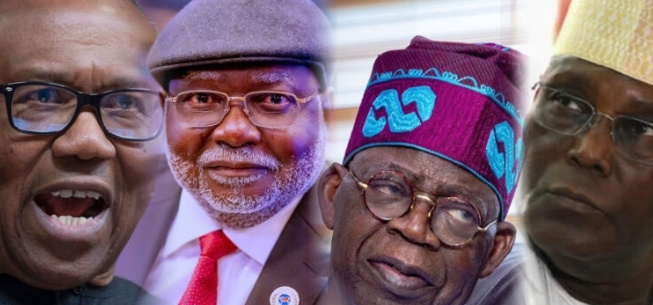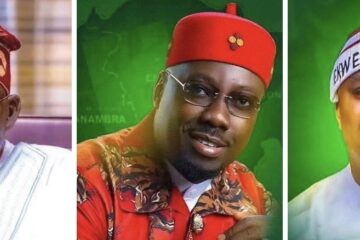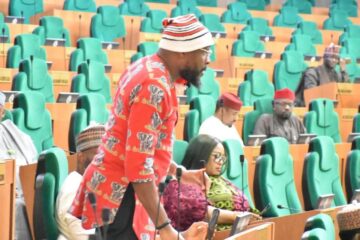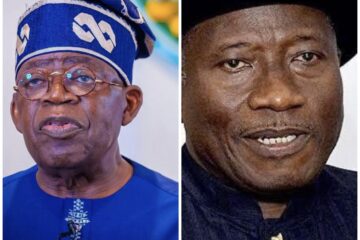The judicial trenches are certainly not unfamiliar terrain for Peter Obi, the presidential candidate of the Labour Party (LP) in the 25 February general election.
About 20 years ago, Mr Obi contested the 19 April, 2003 governorship election in Anambra State on the crest of newly registered All Progressives Grand Alliance (APGA). After Chris Ngige of the Peoples Democratic Party (PDP) was declared winner in the race by the Independent National Electoral Commission (INEC), Mr Obi rejected the result and went to court for redress where he recorded a historic success.
On Monday 13 March, Mr Obi stated that he would not accept the result of this year’s presidential race as declared by INEC because, according to him, it is not God’s wish for the country. He expressed his readiness to challenge the process by which the electoral umpire arrived at their declaration of the candidate of the All Progressives Congress (APC), Bola Ahmed Tinubu as the winner. Mr Obi made the statement during an interview on Arise News TV. He had a week earlier addressed a press conference claiming that he actually won the election and was prepared to prove his claims in court.
The electoral commission, INEC, had in the early hours of 1 March 2023 declared Mr Tinubu as the winner of the election.
Mr Tinubu defeated 17 other candidates who took part in the election. He scored a total of 8,794,726 votes, the highest of all the candidates, thus meeting the first constitutional requirement to be declared the winner.
He also scored over 25 per cent of the votes cast in 29 states, more than the 24 states constitutionally required. INEC Chairman Mahmood Yakubu, a professor of History who announced the final results in Abuja, said Atiku
Abubakar of the PDP came second in the election. Atiku polled a total of 6,984,520 votes in the election while Mr Obi of the LP came third with a total of 6,101,533 votes.
But both Atiku and Obi have since rejected the results as announced by INEC as each of them has laid claim to winning the election and vowing to challenge the exercise in court.
For Mr Obi, he appears attuned to the intricate contours of the judicial process. He is a beneficiary of the judicial process in Nigeria’s electoral history. After two years and 11 months of judicial fireworks, the tenure of Mr Ngige as Anambra State Governor ended on a dramatic note on 15 March 2003 when, by a unanimous ruling, a five-member panel of the Court of Appeal upturned his victory and affirmed Mr Obi as the winner of the April 2003 gubernatorial election in the state.
In its ruling, the appeal court upheld the decision of the lower tribunal that Mr Obi ought to have been declared the winner and sworn in as the validly elected governor of Anambra State on 29 May 2003. The verdict was the product of Mr Obi’s pursuit of his mandate through the judicial process notwithstanding daunting odds.
Mr Obi’s swearing-in as governor on 17 March 2006 made Anambra the first state to alter the governorship transition calendar in the country as he became the first candidate to unseat a sitting governor through the judicial process. However, less than eight months after he was sworn in as governor, Mr Obi was impeached and removed from office by the state House of Assembly on 2 November 2006.
His deputy, Virginia Etiaba, was sworn in as the substantive governor in his stead the next day, 3 November 2006, making her the first-ever female state governor in Nigeria.
For the second time, Mr Obi approached the court. Then, it was to challenge his impeachment. He argued that he committed no wrongs to warrant his removal. While in court striving to reclaim his mandate, processes for the 2007 governorship were in top gear. He triumphed at the Enugu Division of the Court of Appeal and was reinstated as governor on 9 February 2007. Mrs Etiaba handed the reins of power in the state back to him and reverted to her previous position as the deputy governor.
Mr Obi was advised to collect and file a nomination form as his party’s (APGA) candidate for the fast-approaching governorship election but he refused, insisting that he still had three years left in his tenure as governor
having just spent barely a year in office after the sack of Mr Ngige by the appeal court. His stance stirred controversies both in Anambra State and nationwide then with some commentators berating him for overstretching his luck while others urged him not to shy away from contesting an election that he was expected to win on merit. But Mr Obi stuck to his gun by steering away from the 2007 governorship polls despite the entreaties for him to contest.
In line with widespread expectation, Mr Obi lost the governorship seat for the third time when he had to leave office on 29 May 2007. Following the governorship election of 14 April 2007 which he stayed away from on the premise that it was illegal in the state, the candidate of the PDP, Andy Uba, was declared the winner by INEC and subsequently inaugurated as governor on 29 May 2007.
Mr Obi pressed on with his subsisting case in court, not minding the impending governorship election. His major contention was that the four-year tenure he was entitled to as a result of his restored victory in
the 19 April 2003 general elections only started to run when he took office on 17 March 2006. On 14 June 2007, the Supreme Court in a landmark verdict upheld Mr Obi’s contention by sacking Mr Uba and reinstating Mr Obi to office as the governor. The judgment brought the tenure of Mr Uba to a dramatic end and paved the way for Mr Obi to complete his four-year tenure on 17 March 2010.
Mr Obi contested again and was re-elected. He served out his second tenure without hindrance on 17 March 2014 when he handed over to his successor, Willie Obiano.
Mr Obi’s judicial battles not only made Anambra the first state in Nigeria to have an off-season governorship election but also opened the floodgate for others like Kogi, Osun, Ekiti, Bayelsa, Edo, Ondo and Imo to follow in the same trajectory.
Reiterating his respect for traditional rulers and religious leaders, during his interview with Arise Television on Monday, the former Anambra State governor disagreed with the narrative that the outcome of the recent polls as pronounced by INEC was the wish of God for Nigeria.
“I’m very respectful to them (traditional rulers and religious leaders) and I think that they should be respected for what they represent to society. But I disagree with them. What they are actually preaching is the problem of Nigeria. The problem of Nigeria is accepting wrongdoing and accepting what is unacceptable.
“That is using God’s name in vain. That is not what God is saying. God said do not use my name in vain. So, what they are saying is not God’s wish, it is not God’s plan for Nigeria…That’s not what God’s will says. God’s will
is that when you do the right thing then in the end it is well.”
He said Nigeria has laws guiding the conduct of elections and it is not the wish of God that they should be violated.
“We have clear laws about the conduct of the election; it’s not God’s wish that we do the wrong thing. We want God’s wish to be truly God’s wish…Is it God’s wish that we steal or conduct the wrong election?” he asked.
Despite being previously viewed by pundits as a structure-less underdog in the race, Mr Obi polled over six million votes in the presidential election. He also won in 12 states (including Abuja), the same number as the president-elect, Mr Tinubu, and Atiku.
In his interview on Arise TV, Mr Obi sought the cooperation of INEC for his election petition.
“INEC is a public institution and it should be open. Because if you do something and people are not satisfied then you should be able to open up yourself,” he said.
“INEC has conducted an election and announced the winner but I am only asking that I have access to the materials that were used to arrive at the result. I am not asking you to change what you said.
“I’m not challenging their declaration. Or rather, I am not challenging who they declared. I am not challenging whatever the outcome is. I’m challenging the process by which they arrived at their declaration.
“And unless we do that, we are not going to stop the rascality we witnessed in that election. The process through which people come into the office is far more fundamental than what they do thereafter…There is a process of doing things, of arriving at every destination. A process is important,” Mr Obi stated.
By challenging the presidential election in court, Mr Obi, like Atiku, seeks to achieve what no other losing presidential candidate has achieved.
Since the beginning of the current democratic dispensation 24 years ago, no candidate has successfully challenged the result of the presidential election. Will Obi tilt the apple cart? Previous presidential
elections in 2007, 2011 and 2019 were unsuccessfully challenged despite the inadequacies in the elections.
The incumbent president, Muhammadu Buhari, challenged the 2007 and 2011 presidential elections in court. The runner-up in this year’s presidential election, Atiku, who was also the running up four years ago, challenged in 2019 but also failed in the court. In the impending battle in the court for this year’s contest, both Atiku and Mr Obi are key dramatis personae.
While many Nigerians might have lost confidence in the country’s judiciary due to some controversial court verdicts in recent years, Mr Obi does not seem to partake in such pessimism.
A recurring question on the lips of many analysts and observers, therefore, is, will Mr Obi achieve an encore by altering the calendar of Nigeria’s presidential election as he did that of the governorship 20 years ago?
[Premium Times]




